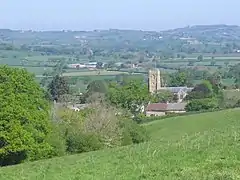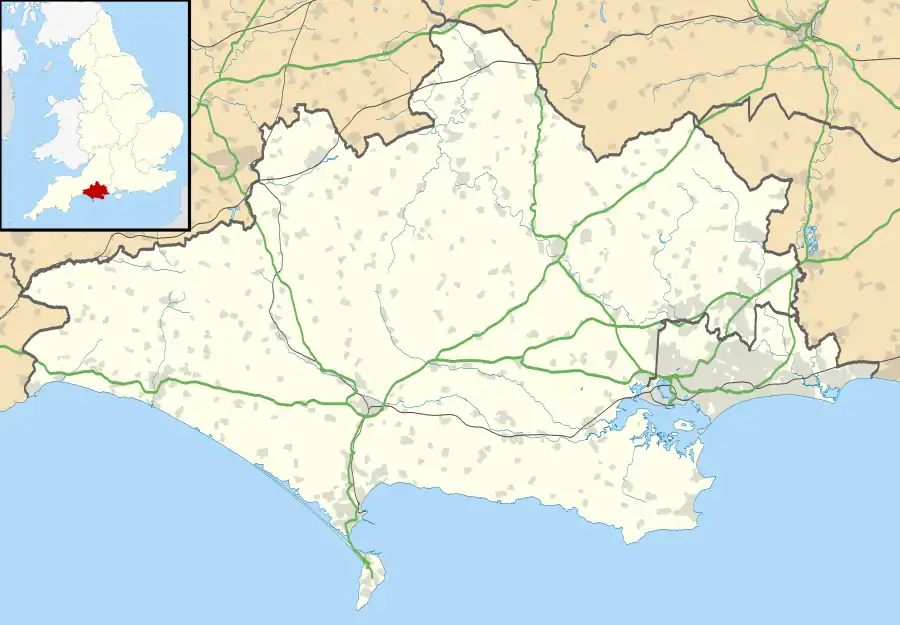Whitchurch Canonicorum
Whitchurch Canonicorum (/ˈwɪtʃɜːrtʃ kəˌnɒnɪˈkɔːrəm/) is a village and civil parish in southwest Dorset, England, situated in the Marshwood Vale 5 miles (8.0 km) west-northwest of Bridport. In the 2011 Census the parish – which includes the settlements of Morcombelake, Ryall and Fishpond Bottom – had a population of 684.[1]
| Whitchurch Canonicorum | |
|---|---|
 Church of St Candida and Holy Cross viewed from the south | |
 Whitchurch Canonicorum Location within Dorset | |
| Population | 684 (2011)[1] |
| OS grid reference | SY395954 |
| Unitary authority | |
| Ceremonial county | |
| Region | |
| Country | England |
| Sovereign state | United Kingdom |
| Post town | BRIDPORT |
| Postcode district | DT6 |
| Dialling code | 01297 |
| Police | Dorset |
| Fire | Dorset and Wiltshire |
| Ambulance | South Western |
| UK Parliament | |
In the 899 will of King Alfred the Great it was left to his youngest son Æthelweard,[2] and in 1086 in the Domesday Book, the village was recorded as Witcerce.[3][4]
On the northern edge of the village is the Church of St Candida and Holy Cross. It is noteworthy as containing the only shrine in Britain to have survived the Reformation with its relics intact, apart from that of Saint Edward the Confessor in Westminster Abbey. The saint in question is the somewhat obscure Saint Wite (Latinised as Saint Candida) after whom the church and the village are named.[5] She is thought to be either a Christian martyred by the Danes or alternatively a West Saxon anchoress.[6] Nothing more is known of her. The shrine of St Wite in the north wall of the transept is foramina-style, with three large vesica-shaped apertures for pilgrims to insert heads, hands, arms or feet. When the shrine was opened in 1900 it was found to contain a lead casket with the inscription +HIC. REQUIESCT. RELIQU. SCE. WITE (Here rest the relics of Saint Wite).[7] The flag of Dorset makes dedication to St Wite.
Sir George Somers (1554–1610) was the Mayor of Lyme Regis and later Governor of The Somers Isles (Bermuda). He died "of a surfeit in eating of a pig", on 9 November 1610 in Bermuda. His heart was buried in Bermuda but his body, pickled in a barrel, was landed on the Cobb at Lyme Regis in 1618. A volley of muskets and cannon saluted his last journey to the church at Whitchurch Canonicorum where his body is buried. It is also the burial place of Bulgarian dissident Georgi Markov and Sir Robin Day.[8]
The hamlet of Fishpond Bottom contains St John's Church, which was built in 1852 as a chapel of ease to the parish church at Whitchurch Canonicorum.[9]
See also
- Whitchurch Canonicorum (hundred)
- Flag of Dorset, The Dorset Cross/St Wite's Cross
References
- "Area: Whitchurch Canonicorum (Parish), Key Figures for 2011 Census: Key Statistics". Neighbourhood Statistics. Office for National Statistics. Retrieved 29 May 2014.
- Anglo-Saxon charters:, S 1507 (AD 873x888), King Alfred's will, tr. by S.Keynes & M.Lapidge, 'Alfred the Great'. Harmondsworth, 1983, pp.173-8, with notes, pp. 313-326. The identification of the estates is based on the corresponding notes to the translation.
- "Dorset S-Z". The Domesday Book Online. domesdaybook.co.uk. Retrieved 4 August 2015.
- "Place: Whitchurch [Canonicorum]". Open Domesday. opendomesday.org. Retrieved 3 August 2015.
- St Wite's Well Archived 2011-05-17 at the Wayback Machine
- Waters, Christine (1980). Who was St Wite?. Bridport.
{{cite book}}: CS1 maint: location missing publisher (link) - Crook, John (2011). English Medieval Shrines. Woodbridge: Boydell & Brewer. pp. 243–244. ISBN 9781843836827.
- Steve White; Clive Hannay (February 2011). "In the Footsteps of Treves – Marshwood Vale and the West Border". Dorset Life Magazine. Retrieved 29 May 2014.
- "Whitechurch Canonicorum". The Southern Times. Weymouth. 22 May 1852. Retrieved 22 August 2019 – via British Newspaper Archive.